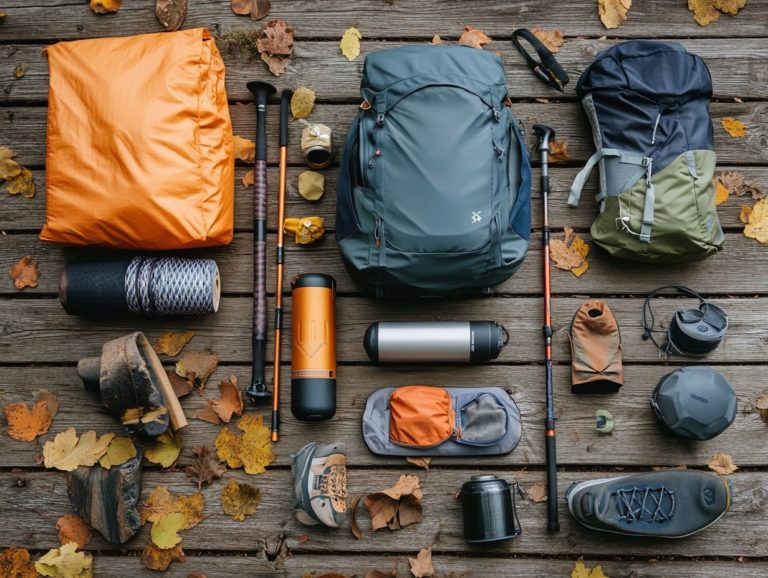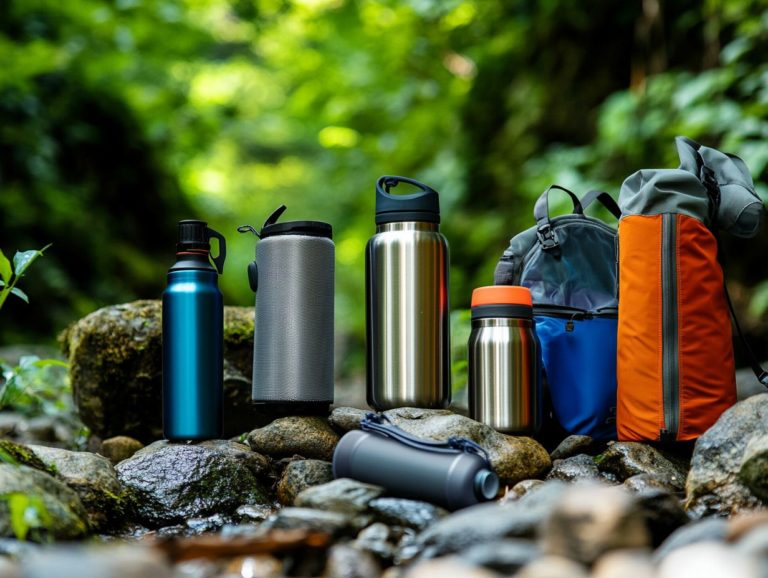The Impact of Hiking on Mental Health
Hiking is not just a way to enjoy nature. It can transform your mental health.
This article explores the connection between outdoor adventures and emotional well-being. Hiking can help reduce stress, boost your mood, and enhance self-esteem.
It examines the physical benefits of hitting the trails, particularly the natural feel-good chemicals released, and provides practical tips for seamlessly integrating hiking into your routine.
It also highlights important safety measures to ensure your experience is both enjoyable and secure. Join us and see how hiking can revolutionize your mental well-being!
Contents
- Key Takeaways:
- The Connection Between Hiking and Mental Health
- Mental Health Benefits of Hiking
- Physical Benefits of Hiking for Mental Health
- How to Incorporate Hiking into Your Mental Health Routine
- Precautions and Safety Measures when Hiking for Mental Health
- Frequently Asked Questions
- 1. How does hiking impact mental health?
- 2. Can hiking help with depression and other mood disorders?
- 3. Are there any specific mental health disorders that hiking can benefit, and how?
- 4. How frequently should I hike to see mental health benefits and improve my physical health?
- 5. Is it necessary to hike alone for mental health benefits or can hiking with friends be beneficial?
- 6. What should I do if I am unable to hike due to physical limitations, and what are some alternative outdoor activities?
Key Takeaways:
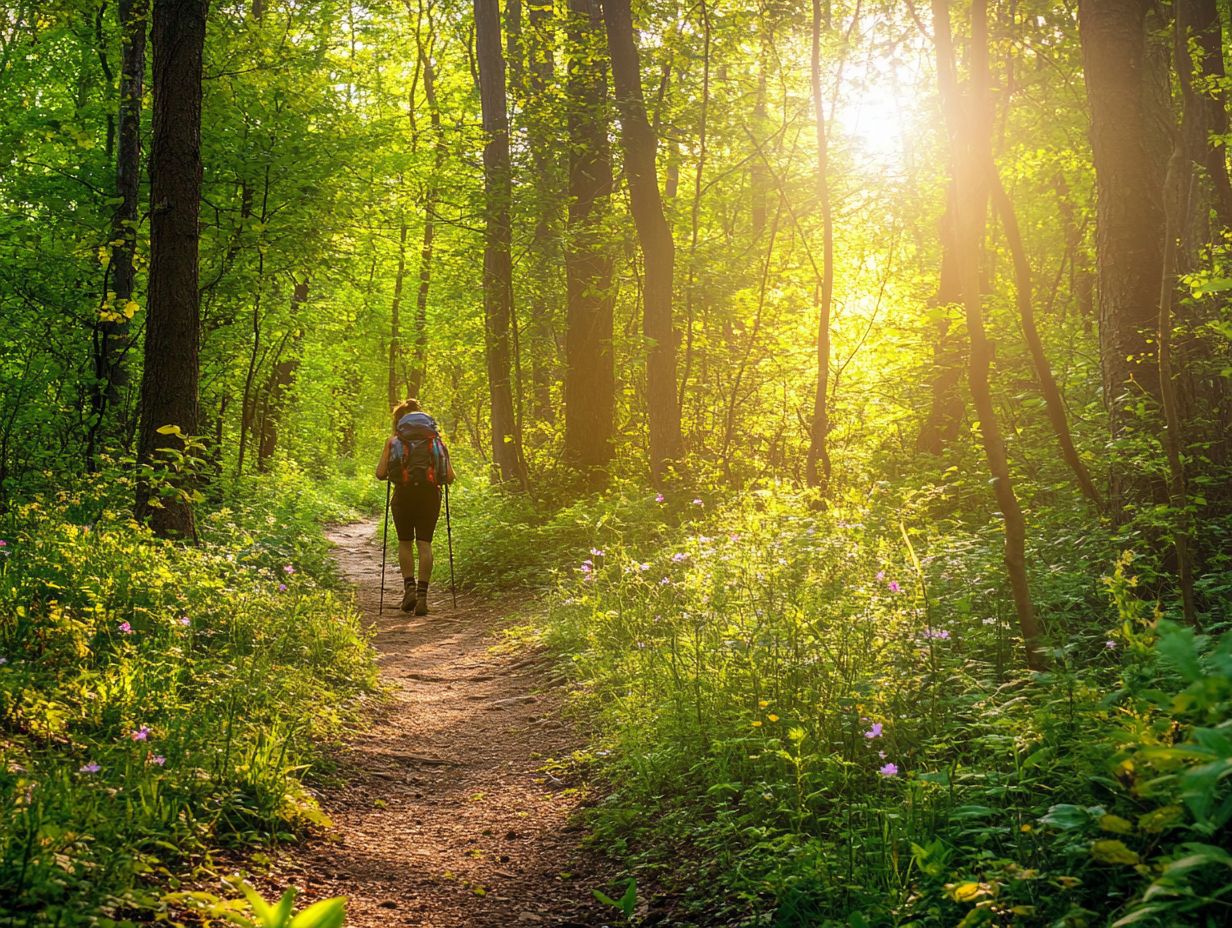
- Hiking positively impacts mental health by promoting the mind-body connection.
- Regular hiking reduces stress and anxiety, improves mood, and boosts brain function.
- Incorporate hiking into your routine by starting small, setting goals, and prioritizing safety.
The Connection Between Hiking and Mental Health
Hiking presents an exquisite opportunity for outdoor exercise that elegantly bridges the connection between mind and body, offering profound benefits for both mental health and emotional well-being.
Research indicates that immersing yourself in nature boosts physical health through calorie expenditure and enhanced cardiovascular performance. It also significantly elevates cognitive function, self-esteem, and overall mental wellness.
Drawing from nature therapy, which uses nature to improve mental health, hiking helps with stress relief and improves your mood.
In a world increasingly shaped by urbanization and mental health challenges, hiking stands as an essential practice for holistic well-being.
Exploring the Mind-Body Connection
The mind-body connection unfolds beautifully during your hiking adventures. Every step outdoors becomes an opportunity for mindfulness and a boost to your mental wellness.
As you navigate various terrains and take in the sights and sounds of nature, you naturally become more attuned to your thoughts and feelings, nurturing a deeper sense of awareness. Engaging with the natural world heightens your appreciation for your surroundings and serves as a potent antidote to stress.
Research in environmental science shows that spending time in green spaces can lower cortisol levels, promoting relaxation and resilience.
This immersive experience in nature invites you to fully embrace the present moment, ultimately enhancing your emotional well-being and strengthening your ability to tackle daily challenges.
Mental Health Benefits of Hiking
Hiking presents an impressive array of mental health benefits, delivering notable reductions in stress and anxiety. It also enhances self-esteem and emotional well-being, particularly for those grappling with mood disorders.
Reducing Stress and Anxiety

One of the standout benefits of hiking is its remarkable ability to reduce stress. It helps you manage anxiety through the perfect blend of nature and physical activity.
Research reveals that spending time outdoors can significantly lower your cortisol levels, the hormone linked to stress. In fact, studies show that those who hike regularly experience a 30% drop in anxiety levels after their excursions.
This natural remedy boosts your mood through the release of endorphins and provides a meditative experience as you immerse yourself in the beauty of your surroundings.
For optimal stress management, consider selecting trails that align with your fitness levels. This way, you can maintain a comfortable pace while also allowing yourself mindful moments like deep breaths or simply soaking in the scenery throughout your hike.
Improving Mood and Self-Esteem
Hiking is a great way to improve your mood and self-esteem, especially if you re dealing with emotional challenges or mental health concerns.
As you move rhythmically through nature, the combination of physical activity and the beauty around you triggers the release of endorphins hormones that make you feel happy. Imagine the thrill of tackling a demanding trail, each step pushing you beyond what you thought were your limits. When you finally reach the summit, the overwhelming sense of accomplishment and your connection to the environment can lead to significant changes in how you see yourself.
Countless stories exist of individuals who embarked on hiking retreats, discovering not only tranquility along the trails but also clarity and resilience. This newfound strength allows you to navigate life s challenges with a refreshing sense of positivity and purpose.
Physical Benefits of Hiking for Mental Health
The physical benefits of hiking significantly enhance your mental well-being. As you immerse yourself in this invigorating outdoor activity, you’ll find that your endorphin levels soar and your cardiovascular performance improves.
Hiking boosts your endorphin production, which enhances brain function and supports your mental health through the benefits of regular physical activity. You’ll feel a surge of these naturally occurring chemicals, known for their mood-lifting properties.
This biochemical reaction not only alleviates feelings of stress and anxiety but also plays a vital role in boosting cognitive functions like memory and focus. Adults are encouraged to engage in moderate-intensity exercises, such as hiking, for at least 150 minutes per week, creating opportunities to enjoy the psychological and physical benefits of connecting with nature.
How to Incorporate Hiking into Your Mental Health Routine
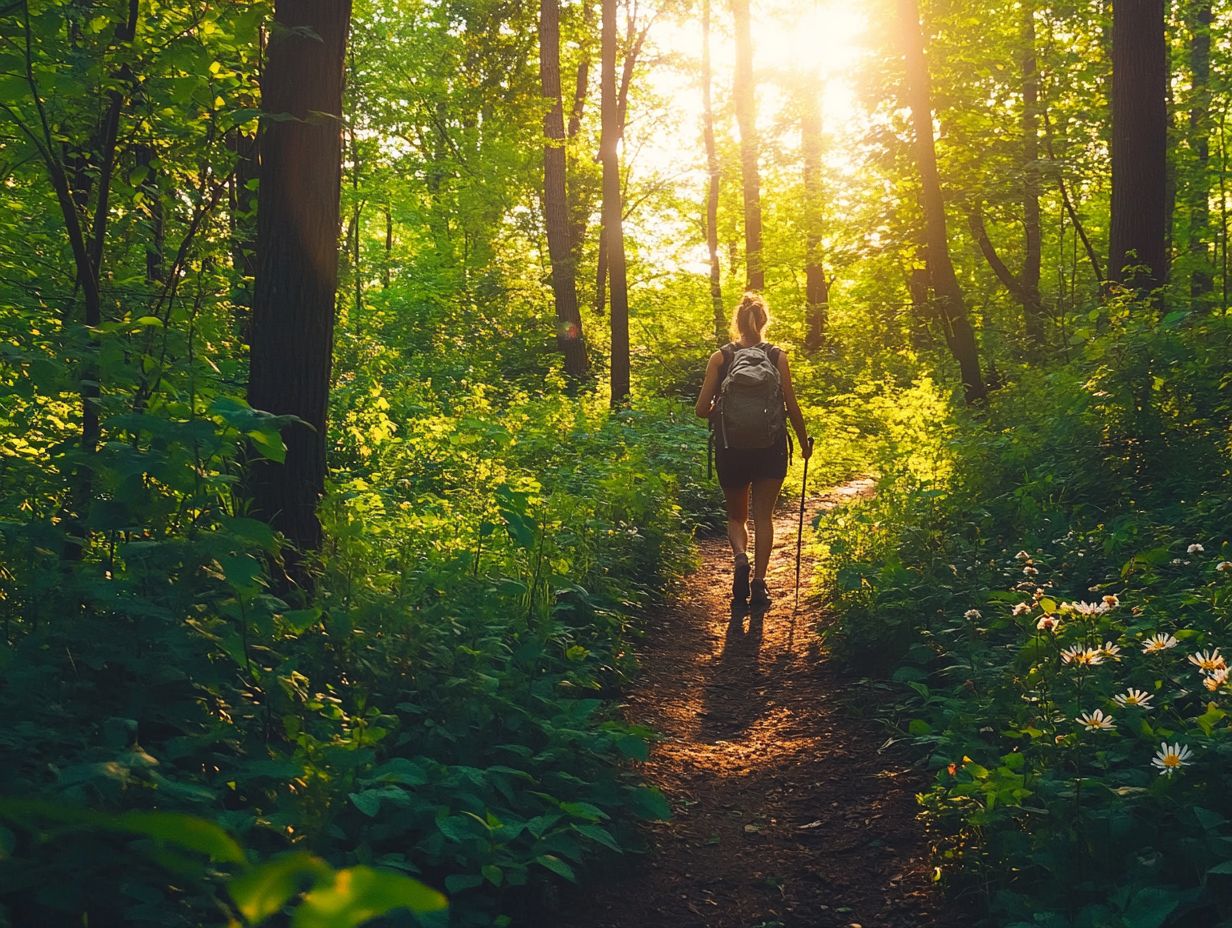
Incorporating hiking into your mental health routine can truly be a transformative journey. By setting achievable hiking goals and establishing consistent routines, you can embrace outdoor exercise strategies that enhance both your well-being and your connection to nature.
Tips for Getting Started and Staying Motivated
Starting with hiking requires practical tips and motivation strategies to help you set realistic hiking goals and choose the right equipment for your journey.
This venture into the great outdoors can be both exhilarating and a bit intimidating, especially if you re new to it. One of the first steps to ensure a fulfilling experience is selecting the right gear this choice significantly impacts your comfort and safety.
Choosing the right equipment is essential; it helps you find trails that match your skill level while allowing you to discover stunning landscapes. Don’t forget that maintaining proper hydration and nutrition is key; it fuels your body and boosts your endurance, ensuring that every trek becomes an enjoyable adventure.
Precautions and Safety Measures when Hiking for Mental Health
Taking precautions and implementing safety measures while hiking is vital for ensuring a rewarding experience. Especially when you re navigating the diverse challenges posed by varying terrains and unpredictable weather, your preparedness can make all the difference.
Plan your first hike this weekend and experience the benefits for yourself! Share your hiking experiences with friends and encourage them to join you on your journey.
Preparing for Different Terrain and Weather
Prepare for different terrains and unpredictable weather. Equip yourself with the right gear and take safety precautions.
You need to be ready to tackle everything from rocky mountain paths to muddy forest trails. For rocky terrains, sturdy footwear with excellent grip is fundamental. In marshy areas, waterproof boots are a must. When navigating sandy landscapes, lightweight, breathable clothing enhances comfort.
Weather can change in the blink of an eye, so layering is key. Choose shirts that keep sweat away from your skin, insulating mid-layers, and waterproof outer shells to maximize adaptability.
Remember these essential items:
- A reliable map and compass: Helps you navigate your route.
- A first-aid kit: Essential for treating minor injuries.
- Sufficient water and snacks: Keeps your energy up during hikes.
Start your hiking adventure prepared and confident!
Frequently Asked Questions
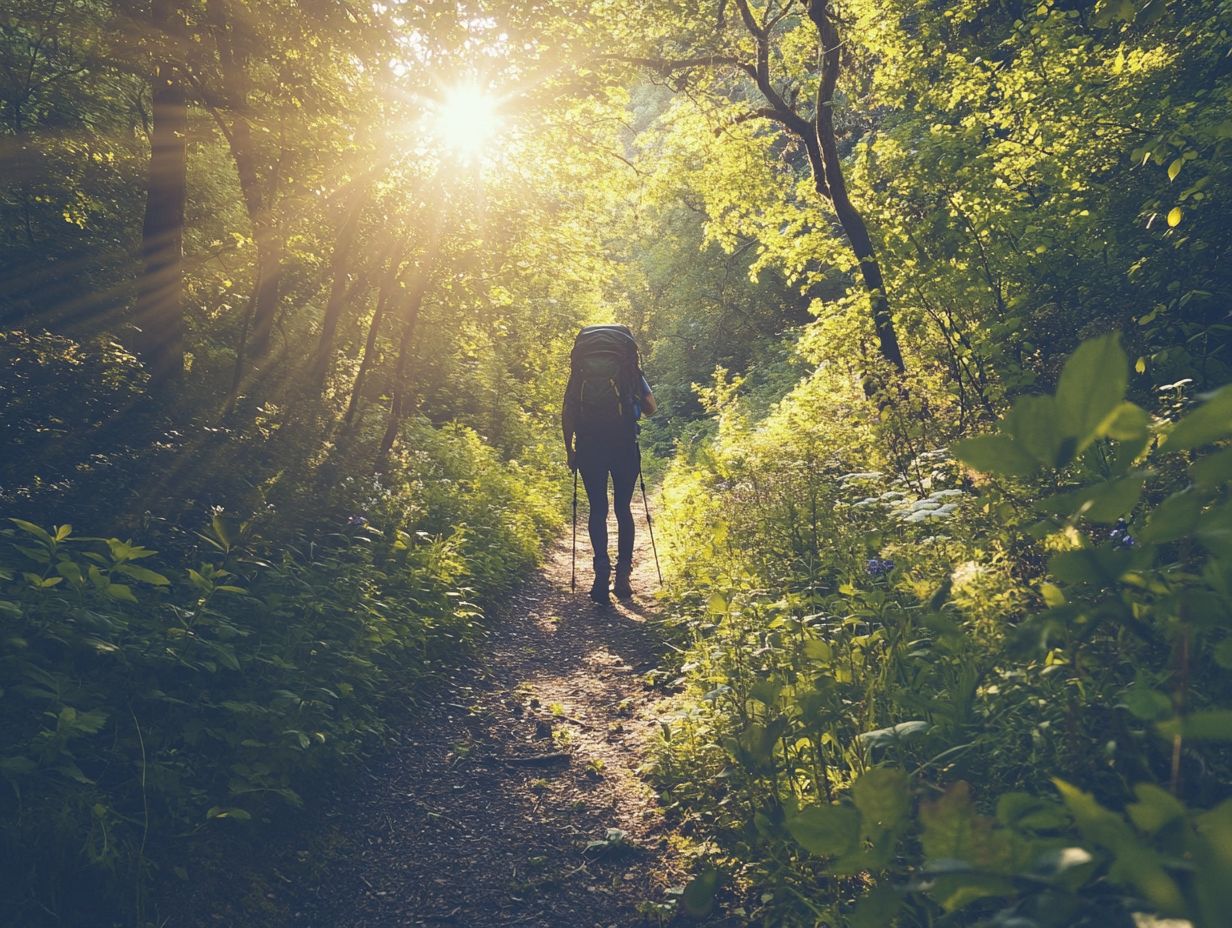
1. How does hiking impact mental health?
Hiking has many benefits for mental health, including reducing stress and anxiety, improving mood and self-esteem, and increasing overall feelings of well-being.
2. Can hiking help with depression and other mood disorders?
Yes, hiking can be a powerful tool in managing and improving symptoms of depression. Being in nature and engaging in physical activity can release endorphins and improve overall mood and outlook.
3. Are there any specific mental health disorders that hiking can benefit, and how?
Hiking has been shown to be beneficial for a variety of mental health disorders, including anxiety, PTSD, ADHD, and bipolar disorder.
4. How frequently should I hike to see mental health benefits and improve my physical health?
The frequency of hiking can vary for each individual. However, even just one hike a week has been shown to positively affect mental health. The key is to find a hiking frequency that works for you and your schedule.
5. Is it necessary to hike alone for mental health benefits or can hiking with friends be beneficial?
No, hiking with others can also have positive impacts on mental health. Socializing and connecting with others while hiking can provide additional benefits, such as improving relationships and promoting a sense of community.
6. What should I do if I am unable to hike due to physical limitations, and what are some alternative outdoor activities?
If hiking is not feasible for you, there are still ways to experience nature and reap mental health benefits. Consider trying other outdoor activities such as nature walks, gardening, or simply sitting outside and enjoying the fresh air.

